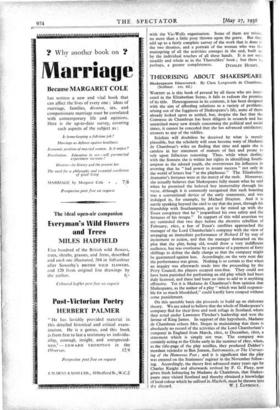THEORISING ABOUT SHAKESPEARE
Shakespeare Discovered. By Clara Longworth de Chambrun. (Scribner. I2S. 6d.) Shakespeare Discovered. By Clara Longworth de Chambrun. (Scribner. I2S. 6d.)
WoRTHY as is this book of perusal by all those who are inter- ested in the Elizabethan Scene, it fails to redeem the promise of its title. Heterogeneous in its contents, it has been designed with the aim of affording solutions to a variety of problems arising out of the fogginess of Shakespeare's life, some of them already looked upon as settled, but, despite the fact that the Comtesse de Chambrun has been diligent in research and has unearthed many new details concerning the political and social times, it cannot be conceded that she has advanced satisfactory answers to any of the riddles.
Sciolists will doubtless be deceived by what is merely plausible, but the scholarly will soon become wary of Madame de Chambrun's wiles on finding that time and again she is careless in her statement of matters of fact and prone to rely upon fallacious reasoning. Thus, while when dealing with the Sonnets she is within her rights in identifying South- ampton as the adored youth, she overstresses his influence in averring that he "had power to assure success" not only in the world of letters but " at the playhouse." The Elizabethan dramatist's fortunes were at the mercy of the mob. Moreover, she actually believes that Shakespeare fully meant what he said when he promised the beloved boy immortality through his verse, although it is commonly recognised that such boasting was a conventional device of the early sonneteers, and was indulged in, for example, by Michael Drayton. And it is surely speaking beyond the card to say that the poet, through his friendship with Southampton, got so far mixed up with the Essex conspiracy that he "jeopardised his own safety and the fortunes of his troupe." In support of this wild assertion we are reminded that two days before the abortive rebellion of February, i6or, a few of Essex's satellites approached the manager of the Lord Chamberlain's company with the view of arranging an immediate performance of Richard // by way of incitement to action, and that the manager demurred on the plea that the play, being old, would draw a very indifferent audience, but was overborne by a promise of a payment of forty shillings to defray the daily charge so that the company might be guaranteed against loss. Accordingly, on the very next day the performance was given. Nothing is so certain as that when an inquiry was afterwards made into the proceeding by the Privy Council, the players escaped scot-free. They could not have been punished for performing an old play which had been duly licensed, and there had been no time to add to it anything offensive; Yet it is Madame de Charnbrun's firm opinion that Shakespeare, as the author of a play "which was held responsi- ble for so much bloodshed," could hardly have escaped without some punishment.
On this unstable basis she proceeds to build up an elaborate theory. We are asked to believe that the whole of Shakespeare's company fled for their lives and took refuge in Scotland, where they acted under Lawrence Fletcher's leadership and won the favour of King James. In support of this hypothesis, Madame de Chambrun echoes Mrs. Stopes in maintaining that there is absolutely no record of the activities of the Lord Chamberlain's company in England from March, 16oz, to December, 1602, a statement which is simply not true. The company was certainly acting at the Globe early in the summer of z60t, when, as the title-page of the play testifies, they produced Dekker's mordant rejoinder to Ben Jonson, Satiromastix, or The Untruss- ing of the Humorous Poet ; and it is significant that the play was entered on the Stationers' register in the November follow- ing. Accordingly, the theory first advanced many years ago by Charles Knight and afterwards revived by P. G. Fleay, now given fresh bolstering by Madame de Chambrun, that Shakes- peare once visited Scotland and thereby obtained a knowledge of local colour which he utilised inMacbeth, must be thrown into


















































 Previous page
Previous page